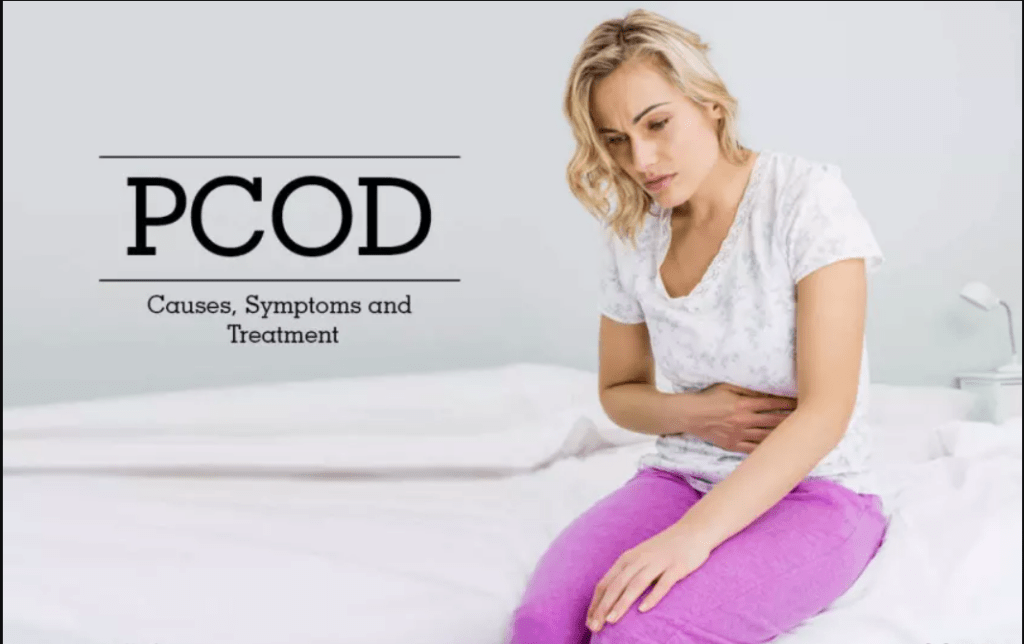PCOD- CAUSES ,SYMPTOMS AND TREATMENT
PCOD-Polycystic ovary syndrome is a disorder in which the ov aries create an excess of androgens, male sex hormones that are normally present in tiny amounts in women. The numerous tiny cysts that occur in the ovaries are known as polycystic ovarian syndrome. Some women with this illness do not produce cysts, while others who do not have the disease do. Ovaries emit inordinate levels of testosterone, causing havoc with female hormonal control.

Causes Of PCOD
- Excess androgen:-Excess androgen produced by the ovaries can result in hirsutism and acne.
- Insulin overproduction: The insulin hormone regulates blood sugar levels in the human body. The blood sugar level rises when human cells grow resistant to the action of insulin. As a result, the body produces too much insulin to keep the blood sugar level in check. Excess insulin production leads to an increase in the production of androgens, which are male hormones that are produced in much lower amounts in females.
- There is a link between PCOD and low-grade inflammation thus excess insulin, high production of male hormones (Hyperandrogenism), and heredity. Early menarche, an unhealthy lifestyle, and pollution are some of the reason that leads to PCOD.
- PCOS can occur in both slender and overweight women. However, women with PCOS are at greater risk of being overweight or obese.
Symptoms Of PCOD
PCOS symptoms are missed, irregular, infrequent, or prolonged periods. Excess androgens can lead to hair loss, unwanted hair (such as on the face), and acne. Other signs and symptoms include
- Acne
- Skin discoloration
- Hirsutism (abnormal growth of hair on face and body)
- Menstrual cycle irregularity
- Polycystic ovaries
- Ovarian cysts or polycystic ovaries
- Tags on the skin
- Hair thinning Weight increase
- Excessive hair growth or hair loss
- Type 2 diabetes
Treatment Of PCOD
The Permanent cure for PCOD is still in process. The condition can be controlled by altering one’s lifestyle. A multidisciplinary strategy involving a dietician, gynecologist, endocrinologist, dermatologist, and infertility expert is required.
The greatest strategy to control and manage PCOD is to maintain a healthy weight. Even a 5% weight loss can make a significant difference in the treatment of the disease. As a result, PCOD patients must exercise regularly and eat a nutritious diet. The diet should have limited sugars and carbohydrates. Thus, Patients with PCOD should consume a lot of protein and eat a lot of fiber.
Change In Diet
Diet and physical activity is essential. Weight loss and symptom reduction are achieve with a nutritious diet and increased physical exercise. They can also aid in the efficient utilization of insulin, the reduction of blood glucose levels, and the ovulation process.
Ovulation-inducing medications.
Medications can aid in the natural discharge of eggs from the ovaries. But these drugs have also certain hazards associated with them. They have the potential to raise the likelihood of multiple births (twins or more). They can also result in ovarian hyperstimulation. This occurs when the ovaries produce an excessive amount of hormones. It might cause bloating in the stomach and pain in the pelvis.
Medication For Diabetes.
To treat insulin resistance in PCOS patients these medication are frequently in use. It may also help you ovulate more frequently by lowering androgen levels, slowing hair development, and reducing androgen levels.
Your doctor may prescribe hormonal birth control, such as the skin patch or the pill, if you are not expecting to become pregnant. These drugs can help you reduce your risk of endometrial cancer, regulate your periods, clear up acne, and get rid of unwanted body hair, hence Fertility medicines can assist your ovaries release eggs if you wish to get pregnant.
To know more about PCOD, and to Consult our Doctor Click Here.
Leave a reply
